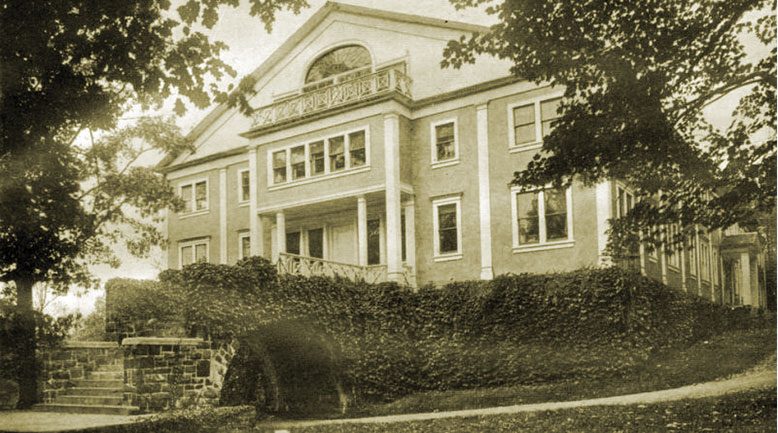
In the fall of 1906, muckraking author and activist Upton Sinclair used the profits from his surprise bestseller, The Jungle, to launch Helicon Home Colony, an experiment in communal living outside Englewood, in Bergen County. Sinclair conceived of the utopian-style project as a democratic haven for creative types who desired communal cooking, childcare and proximity to Manhattan.
Sinclair had previously lived with his wife and young child on an isolated farm in Princeton and wanted an alternative to domestic routine. He ran advertisements and recruited potential residents. Despite Sinclair’s interest in social justice, the colony banned non-whites. Jews also were unwelcome.
The colony was located in a former private school high on the Palisades. It was equipped like a luxurious boutique hotel, with 35 bedrooms featuring interior balconies arranged around an atrium with a prominent, four-sided fireplace. Amenities included an indoor pool, tennis court and bowling alley. But in what would prove to be a deadly design flaw, it had no fire escapes.
The initiation fee was the same for men and women, guaranteeing both sexes the right to vote in the colony’s proceedings. It was quite social; the large atrium hosted frequent group readings, lectures and animated debates. However, each member’s private space was off limits without an invitation. “Among the joys we realized was the opportunity of being alone when you wanted to be alone, and of having friends when you wanted friends,” Sinclair later wrote.
Merely six months after its creation, in the early hours of March 16, 1907, a mysterious fire spread through the commune. Miraculously, all but one of the 70 residents escaped the flames. The ill-fated resident was a carpenter who lived on the top floor. The New York Times reported that the building’s location on a distant hill delayed the response from the local fire department.
Sinclair suspected arson. Some heard loud bangs before the fire. Sinclair alleged that dynamite had been discovered in the basement a few weeks prior.
At the time of the fire, Sinclair was drafting a book that would examine Pittsburgh’s railroad and steel industries. “I do not charge anything,” he told told the Times, “but I state the facts, that the dynamite was found three weeks ago in the cellar, and that I had those papers in my desk.”
Sinclair lost his manuscripts. The colony dissolved shortly after.



